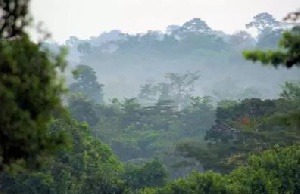Governments and forest actors are about to meet in Ghana to address commodity-driven deforestation, an issue that has risen in global prominence since many major food and consumer goods companies committed to end deforestation in key supply chains in 2010.
These commitments were strengthened in 2014 when governments, businesses, civil society and indigenous peoples’ organisations endorsed the New York Declaration on Forests, calling for halving global deforestation rates by 2020 and ending it by 2030. They were further reinforced by the Sustainable Development Goals by the UN in 2015, and the Paris Agreement on climate change. All require ending and reversing global deforestation.
From May 15 to May 16 2018, Tropical Forest Alliance (TFA) 2020 will host its Annual General Assembly – the first-ever in Africa. The week will finish on 17 May with the Fourth Regional Meeting of the Africa Palm Oil Initiative (APOI). The meeting is convened by the Tropical Forest Alliance 2020 in collaboration with the Government of Ghana and Proforest.
With the clock ticking, many major brands have indeed made bold commitments to remove deforestation from major commodity supply chains by 2020. However, companies are being urged to communicate their plans and successes over the course of the next months, and governments to translate policies into action.
Africa’s tropical forests boast a rich biodiversity of over 23,000 plant and animal species, including three of the world’s four great apes: bonobos, gorillas and chimpanzees. Yet, as in other continents, Africa’s forests are under pressure from agricultural production: rubber and especially palm oil and cocoa.
Forests play an essential role in mitigating climate change as they remove carbon from the atmosphere to store it in biomass and soils. Tropical and temperate forests are effective carbon sinks. However, forests can become a source of GHG emissions when cleared or degraded.
‘Africa's rich tropical forests represent around 20% of the world total but are under increasing pressure from agricultural production. In order to achieve deforestation-free commodity supply chains, and balance economic development in the region, it is vital that we act collectively: ranging from government to the private sector, civil society and indigenous and community groups. The work of the TFA 2020, such as the Africa Palm Oil Initiative, is an important step towards this,’ said Abraham Baffoe, Africa Regional Director of Proforest.
Deforestation and forest degradation account for around 11% of global CO2emissions, which is more than the global transport sector. To meet the commitments made under the Paris Agreement, action on forests and other lands is key to reducing GHG as well as sequestering atmospheric carbon. Scientists estimate that reforestation, avoided forest loss and better forestry practices could cost-effectively remove 7 billion tonnes of carbon dioxide annually by 2030.
“Forests are essential for reaching our climate target. Nature is 37% percent of the solution and forests play a major part in that. They are also an essential vehicle to achieve the sustainable development goals –they protect the world's poor, protect against climate risk and are essential for food security. Deforestation-free commodity supply chains are the supply chains of the future,” said Marco Albani, Director, Tropical Forest Alliance 2020
Business News of Sunday, 13 May 2018
Source: Ekow Quandzie













